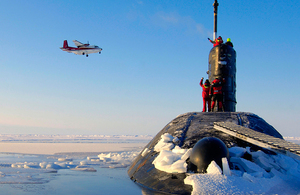Climate change conference addresses future needs in defence
The Defence Science and Technology Laboratory (Dstl) has hosted its first climate change event focusing on sustainability and climate security for defence.

Submarine in ice
The event gave experts, practitioners and stakeholders from defence and security, academia and industry an important opportunity to collaborate, develop relationships, and share ideas and expertise.
Climate change could have many implications for defence, experts were able to come together to develop a clear understanding of science and technology activities (past, current and future), to identify and understand potential science and technology solutions to climate change problems for defence, as well as de-conflict efforts, and identify gaps in research programmes.
The 2 day event in January 2023, opened by Dstl’s Chief Technical Officer, Professor Andy Bell, combined insightful presentations with roundtable working groups.
Andy said:
It is absolutely vital that defence collaborators work together to address the challenges and effects that climate change can have on how our armed forces operate. Attendees at the symposium discussed the major issues and looked at problem solving and ways forward, and was a huge success.
Lt General (Retd) Richard Nugee provided the first keynote speech setting the scope of the challenge. Richard has earned international recognition for bringing the implications of climate change and sustainability to the defence and national security sectors. After a full career in the British Army, as his final role he wrote a review of defence’s approach to climate change and Sustainability. He is now the Non-Executive Director for Climate Change and Net Zero for the Ministry of Defence (MOD).
The focus throughout the event was on collaboration; James Clare, MOD Director Levelling Up, The Union, Climate Change and Sustainability (Dir-LUCCS) reinforced the message that climate change is not a future concern.
It will change where we operate, who we operate with, what we need to operate, and how we need to operate. Climate change will also impact on how the MOD will function as an organisation and that response has to be whole system or whole enterprise.
Gen (Retd) Tom Middendorp, Chairman of the International Military Council on Climate and Security (IMCCS) gave a presentation on Walking the Climate-Security Talk with the clear message to ‘think big, act small, start somewhere.’ In this he gave examples of how defence has and can build partnerships and ecosystems and provided an overview of a climate-security ecosystem bringing together security experts, research institutes and government officials through the IMCCS.
Lt Gen Richard Wardlaw emphasised that delivering the outcomes sought through the recently published Sustainable Support Strategy will require collaboration across defence and with academia, industry and our allies.
In a motivating keynote Lt Gen Wardlaw said:
We must focus our attention to the Sustainable Support Strategy as, this is an opportunity for defence, a solution for the future force in a climate changed world. It is also an opportunity to enhance military capability with emissions reduction as a consequence not as a force driver. I would ask that with the recent publication of the Sustainable Support Strategy, we view this event an open invitation to help us on that journey.
This event is just the beginning for the science and technology research programme. To continue the conversation and be notified of future events please contact Support&Sustainability@dstl.gov.uk